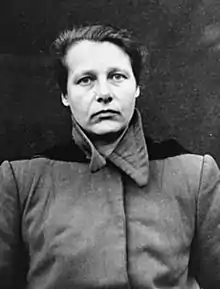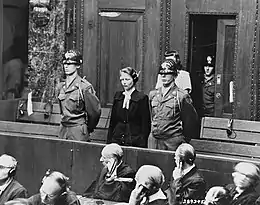Herta Oberheuser
Herta Oberheuser (15 May 1911 – 24 January 1978) was a Nazi physician and convicted war criminal who performed medical atrocities on prisoners at the Ravensbrück women's concentration camp. She was sentenced to 20 years' imprisonment at the Nuremberg Doctors' trial, but served only five. A survivor of Ravensbrück termed her, "a beast masquerading as a human".[1]
Herta Oberheuser | |
|---|---|
 Oberheuser in 1946 or 1947 | |
| Born | May 15, 1911 Cologne, German Empire |
| Died | January 24, 1978 (aged 66) Linz am Rhein, West Germany |
| Nationality | German |
| Occupation | Physician |
| Years active | 1937-1945, 1952-1958 |
| Known for | performing medical atrocities on prisoners at the Ravensbrück concentration camp |
| Medical career | |
| Field | dermatology |

Education and Nazi Party membership
In 1937, Oberheuser obtained her medical degree in Bonn, having specialized in dermatology.[2] Soon thereafter she joined the Nazi Party as an intern, and later served as doctor for the League of German Girls.[2] In 1940, Oberheuser was appointed to serve as an assistant to Karl Gebhardt, then Chief Surgeon of the Schutzstaffel and Heinrich Himmler's personal doctor.[2]
War crimes
Oberheuser and Gebhardt came to Ravensbrück in 1942 in order to conduct experiments on its prisoners, with an emphasis on finding better methods of treating infection.[2] They conducted gruesome medical experiments (treating purposely infected wounds with sulfanilamide, as well as bone, muscle, and nerve regeneration and transplantation) on 86 women, 74 of whom were Polish political prisoners in the camp.[3]
Trial
Herta Oberheuser was the only female defendant in the Nuremberg "Doctors' trial", where she was convicted of crimes against humanity and sentenced to 20 years in prison.[4]
Later life
Oberheuser was released in April 1952 for good behaviour and became a family doctor in Stocksee, near Kiel, in West Germany. She lost her position in August 1958 after a Ravensbrück survivor recognized her, and the interior minister of Schleswig-Holstein, Helmut Lemke, revoked her medical license and shut down her practice. Oberheuser appealed to the Schleswig-Holstein administrative court, which rejected the appeal in December 1960. She did not practice medicine again and was fined as punishment.[5][6] She died in January 1978 at the age of 66.[2]
References
- Kater, Michael H. (1987). "The Burden of the Past: Problems of a Modern Historiography of Physicians and Medicine in Nazi Germany". German Studies Review. 10 (1): 31–56. doi:10.2307/1430442. ISSN 0149-7952. JSTOR 1430442. PMID 11653789.
- Mikaberidze, Alexander (2013-06-25). Atrocities, Massacres, and War Crimes: An Encyclopedia [2 Volumes]: An Encyclopedia. ABC-CLIO. ISBN 9781598849264.
- Dawson, Mackenzie (2016-05-08). "After Hitler's pal died, Nazis recreated his injuries in a sick experiment". New York Post. Retrieved 2017-06-19.
- Mitscherlich, Alexander; Miekle, Fred (1992). "Epilogue: Seven Were Hanged". In Annas, George J.; Grodin, Michael A. (eds.). The Nazi Doctors and the Nuremberg Code: Human Rights in Human Experimentation. New York: Oxford University Press. p. 105. ISBN 978-0-19-977226-1.
- Cymes, Michel (2015-01-14). Hippocrate aux enfers - Chapitre 13 - "Elle n'était pas mauvaise" - Herta Oberheuser (in French). Éditions Stock. ISBN 9782234078413.
- Wodenshek, Haley (2015-04-01). "Ordinary Women: Female Perpetrators of the Nazi Final Solution". Senior Theses and Projects.
External links
- Testimony of Helena Hegier, prisoner of Ravensbruck, about medical experiments conducted by Oberheuser
- Paulina Fronczak: Doktor Herta Oberheuser i jej działalność medyczna w KL Ravensbrück w świetle zeznań świadków i ofiar eksperymentów . Acta Universitatis Lodziensis. Folia Historica. Nr 96 (2016).